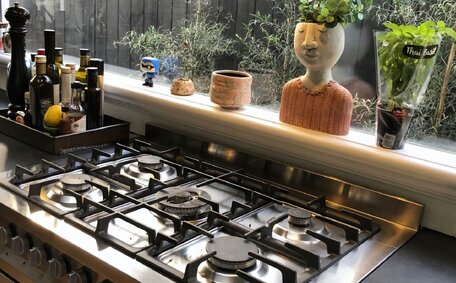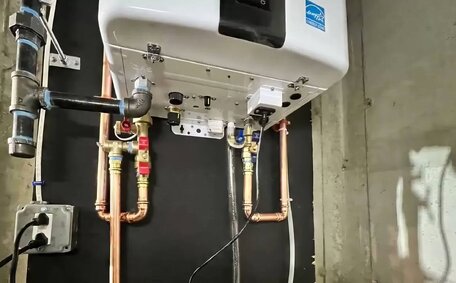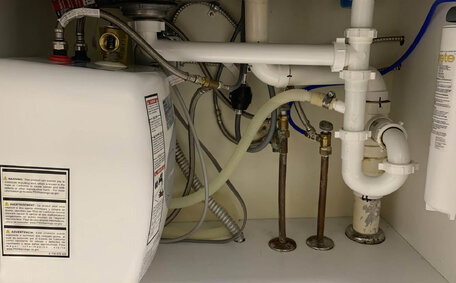Introduction to Water Quality and Plumbing Issues
Good water quality is essential for a healthy, efficient, and durable plumbing system, with neglect leading to costly issues.
Contaminants and impurities in tap water can corrode pipes, clog drains, breed bacteria, and can also cause health risks if consumed. This article investigates the safety of drinking water, its impact on plumbing systems, potential pipe damage, and how regular upkeep saves homeowners money by preventing plumbing emergencies.
We’ll examine how water quality affects plumbing components such as metal and plastic pipes, and water heaters. Mineral buildup, chemicals, sediments, and other contaminants can damage plumbing through corrosion, scale accumulation, leaks, and pipe wear.
We’ll highlight how leaks can become key plumbing emergencies caused by water quality, as well as bursts, backups, and appliance failures. We’ll also outline the health implications for the water your household consumes, and how maintaining your hot water systems can prolong their lifespan and efficiency. Finally, we’ll offer proactive maintenance tips and troubleshooting advice, explaining what plumbing steps to take when dealing with problems before they become a full-blown emergency requiring professional attention.
Common Water Contaminants and Their Effects on Plumbing
There are several common contaminants found in water that can negatively impact plumbing systems:
- Sediment: Sand, silt, and dirt particles can abrade pipe interiors causing wear and tear over time. Sediment buildup can also clog fixtures like faucets and showerheads.
- Minerals: Hard water contains dissolved calcium and magnesium minerals that leave scale deposits inside pipes and water heaters.
- Chlorine: Added as a disinfectant, chlorine is corrosive to metal components like water heaters. It can degrade rubber washers and gaskets leading to leaks. The interaction between chlorine and organics also creates byproducts that contains harmful disinfection elements (DBPs).
- Microorganisms: Bacteria, viruses, moulds, and algae can infect water systems and pose health risks if ingested. They accelerate corrosion and biofilm growth inside pipes.
Understanding how water quality can become compromised and using filtration with regular testing and maintenance protects your water supply; for custom advice, please contact your local plumbing experts. Seeking professional help from our team early can be essential to averting incidents that can diminish the quality of your living conditions and safety.
How Hard Water Causes Scale Buildup and Pipe Damage
Your water system, if not maintained by Professional emergency plumbing services, may succumb to problems like high levels of dissolved minerals such as calcium, magnesium, and manganese. As hard water passes through pipes, appliances, and fixtures, it deposits minerals called scale.
Research shows that a scale thickness of 3 mm can reduce flow rates by nearly 20%. This loss of efficiency leads your hot water system to work harder, which can inflate energy usage and ultimately cost you more, negating opportunities to save money on your utilities. Thick layers of scale act as an insulator that hinders heat transfer too.
The growing scale deposits progressively constrict pipe diameters, leading to a burst pipe – a classic sign of a plumbing emergency due to major pressure drops. This added friction and strain can cause pipes to crack and burst—a crucial moment to call plumber services for emergency assistance.
Chunks of loose scale tend to break off, a challenge plumbers can address by internally abrading pipe walls. Over time, pipes become overly thinning and develop pinhole leaks. Failure to address hard water scale buildup early on can spiral into extensive plumbing repairs.
Microbial Contaminants Pose Health Risks
Microbial contaminants like bacteria, viruses, parasites and mould can lead to significant plumbing problems, raising questions like is your water safe if ingested through drinking water. Microbes springing from sources such as animal waste, pesticides, or decomposing flora leaching into water sources, raise concerns as to whether the water is safe to drink without prior plumbing maintenance.
Microbes proliferate in stagnant areas of your water supply, which can result in biofilm formation and exacerbate leaks in your plumbing system. This slimy layer harbours bacteria, viruses and indicates that your plumbing system can accelerate pipe corrosion. Sudden biofilm discharge escalates the risk of water contamination, possibly necessitating an emergency plumber to forestall waterborne diseases.
Proactive testing, disinfecting, and quickly fixing leaks are crucial steps to prevent microbial hazards and reduce emergency plumbing situations. Public buildings and healthcare facilities, particularly those serving vulnerable groups, require consistent water maintenance to avert plumbing problems. Regular annual inspections and prompt issue resolution, alongside diligent plumbing upkeep, are crucial for enhanced safety.
Chemical Pollutants Can Corrode Pipes and Fixtures
Chemical contaminants like chlorine, pesticides, heavy metals and industrial solvents can all accelerate corrosion within plumbing systems leading to leaks or catastrophic component failures.
Chlorine added during water treatment generates corrosive acids upon contact with organics and metals. Over time, the sustained exposure thins out metal pipes, water heaters, valves and fittings. As corrosion pits walls, pinhole leaks develop, allowing water to damage your property and possessions.
Chemical runoff with solvents or pesticides can corrode plastic and rubber plumbing components, compromising your system’s integrity. Degradation cracks start surfacing in drain lines, storage tanks, and supply hoses posing enormous rupture risks under pressure.
Rust and heavy metals can damage valve interiors and affect your water meter’s accuracy. Accumulated sediment can impair system functionality, leading to sudden failure of components under strain.
Comprehensive water testing and specialised filtration are effective measures to remove harmful chemicals and prevent future issues. Periodic inspections of fixtures and segregation of affected plumbing areas confirm your system’s integrity and can help maintain a lower water bill by averting deterioration before it results in failure. Seeking early assistance from a professional plumbing service can avoid the onset of costly repairs should a problem arise.
Fixing and Preventing Water Quality Plumbing Issues
There are several key steps homeowners can take to address and prevent plumbing issues caused by poor water quality, knowing that To prevent plumbing deterioration:
- Install water filtration systems to remove sediment, minerals, chlorine, and other contaminants, Systems like reverse osmosis and activated carbon filtering can prevent plumbing issues, and homeowners are encouraged to learn more about these options.
- Annually flushing your water heater ensures sediment accumulation is cleared, preventing corrosion and efficiency issues.
- Have water tested yearly which can help identify problem contaminants early. Specialised treatments can then be applied to neutralise risks.
- Inspect your pipes and check fixtures periodically for leaks, cracks or odd smells indicating contamination. Detecting issues before they worsen can allow for isolated repairs that prevent further damage.
- Sanitise stagnant plumbing areas susceptible to microbial proliferation. The installation of backflow prevention devices, coupled with chlorine flushes, is a sophisticated strategy to thwart bacteria and biofilm accumulation.
- Upgrade outdated lead pipes to modern, corrosion-resistant materials to extend longevity.
Proactive plumbing maintenance combined with best practices in water quality ensures family safety and plumbing durability. Partnering with professionals at the first sign of issues ensures clean water and averts your emergency plumbing repairs down the road.
Knowing When to Call a Professional Plumber
Homeowners may find it challenging to decide when professional plumbing help is needed. Minor clogs, leaks, or appliance malfunctions may be DIY-friendly, However, more complex issues including corrosion damage, significant backups, and water contamination, necessitate knowing when it’s crucial to call a plumber for their immediate expertise.
Signs you should call emergency plumber soon with our team at Strathfield Plumbing include:
- Discoloured water with sediment or strange odours
- Significant drops in water pressure may necessitate you to swiftly turn off water at the mains tap
- Gushing leaks that are difficult to isolate
- Recurring clogs in your toilet suggesting drain line damage
- Complete drain or sewer backup situations
- Major appliance failures affecting your pipes and providing hot water or heating
- Backflows bringing exterior water into your home
- Widespread interior water damage from burst pipes
Tackling complex repairs without the right expertise or safety gear, such as rubber gloves and boots, risks complicating issues and inflating costs. When plumbing issues surface, choosing the right licensed plumber for emergency assistance is critical; our licensed professionals have the expertise and equipment to diagnose issues swiftly, implement repairs, and prevent future occurrences. We emphasise prompt, effective resolutions, striving to address issues quickly and comprehensively, thereby reducing the need for emergency services.
For urgent assistance or more information about finding a 'plumber near me’ for your emergency plumbing needs related to water quality in Strathfield, please contact our 24/7 hotline at 1300 349 338 or send us an email. The specialist plumbing services we offer are meticulously crafted to ensure your household’s safety and give you peace of mind when you need to call emergency services for your plumbing infrastructure’s integrity.
Maintaining Good Water Quality with Filtration and Treatment
Systems like reverse osmosis, activated carbon filters, and water softeners help remove sediment, chemicals, minerals and microbes. This will help prevent scale build-up, corrosion, clogs, and leaks in your homes’ plumbing over time. Regular maintenance and appropriate water treatment protect plumbing health long-term.
Embracing a proactive stance by testing water yearly, surveying fixtures regularly, and committing to premium filtration can spare homeowners consequential costs and safeguard your daily living environment.
Conclusion: Proper Plumbing Maintains Water Quality and Health
In summary, recognising that maintenance is essential and maintaining proper health through regular inspection, treatment, and care is crucial for preserving water quality and protecting household health.
Remember, numerous contaminants in water can lead to corrosion, scaling, blockages, leaks, and even illness if not addressed. Let us ensure that investing in water filtration systems alongside annual servicing by professionals averts many disasters before they spiral into full-blown emergencies.
This article has detailed the common contaminants threatening your plumbing system and overall health, along with actionable solutions for homeowners to prevent and address these concerns. Key takeaways include:
- Sediment, minerals, chemicals and microbes in water cause scale, corrosion, blockages and contamination
- Issues like bursts, leaks and illness can emerge from prolonged plumbing exposure
- Filtration using methods like reverse osmosis and water softening is highly effective
- Annual testing, flushing heaters, isolating leaks early and disinfecting stagnant lines controls risks
- Neutralising problematic water conditions maintains integrity of plumbing
We trust that readers now understand the critical significance of water quality for household plumbing and health, recognising that many things can prompt the need to call an emergency plumber for assistance. Don’t hesitate to reach out to our team at Strathfield Plumbing on 1300 349 338 for professional assistance maintaining plumbing systems or addressing any emergencies that may arise.






